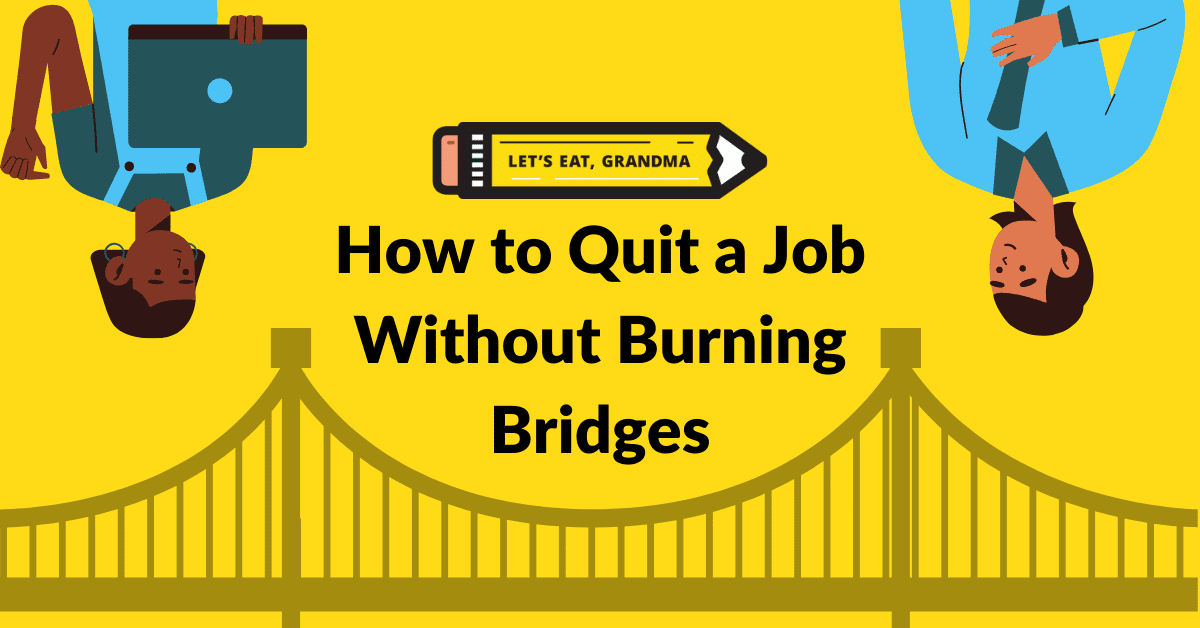How to Quit a Job Without Burning Bridges

Ready to finally quit your job? It’s time to make a plan. These simple steps will help you quit a job without burning bridges and with as little pain as possible.
By: Grace Mitchell | Contributor for Let’s Eat, Grandma
The Great Resignation is upon us, and it shows no signs of slowing down. A recent Bankrate survey found that 55% of Americans in the workforce said they’re either somewhat likely or very likely to look for a new job in the next 12 months. If you’re among the millions who are ready for a change, you may be struggling with how to break the news to your boss.
There is a way to resign with grace, though. Read on to learn how to quit your job without burning bridges.
Tired of not landing interviews?
Get our free 3-step guide to writing better resume bullet points, featuring 70 ideas for metrics you can use!
Breaking Up (With Your Job) Is Hard to Do: How to Quit Without Burning Bridges

The first step to quitting your job is writing a resignation letter. Photo by Scott Graham on Unsplash
If your job is especially trying, you may be tempted to tell your employer exactly why you’re leaving in excruciating detail. However, as satisfying as it may seem in the moment, this approach can only stand to hurt you. A strong reference from your last employer can be the nudge your new employer needs to hire you, after all.
On the other hand, if your love for the job makes you reluctant to leave, you may hesitate to take the steps you need to move forward.
Quitting always requires a letter of resignation, even if you and the boss are best buds, and stating your last day in writing (and then sticking to it!) gives you the chance to put all of your ducks in a row and leave on a positive note.
Whether you’re in one of the above scenarios or somewhere in between, quitting is always awkward, but following these simple steps will help you move past even the most emotionally charged resignation:
1. Write a Resignation Letter That’s Appropriate to Your Situation
Your letter of resignation should be short and simple, like the example we wrote here that you can adapt. You may include a brief statement of your reasoning (for example: “While I’ve enjoyed my time at _____
Your letter should clearly state that you’re leaving and give a last day (more on that in the next point). Offering to help train your replacement and thanking your boss for your time are both great ways to demonstrate your goodwill toward your soon-to-be-ex company. (Plus your boss may ask you to do so regardless.)
You should have your letter of resignation ready to go when you schedule a meeting with your boss, but don’t stress it too much. Just keep it short and classy, and you’ll be good to go.
2. Determine How Much Notice to Give and Provide a Hard Last Day

Deciding on a hard date for your last day of work in advance will make your transition easier. Photo by Jornada Produtora on Unsplash
Having your last day already decided will make it easier to transition out of your current role. This gives you a set deadline to clean out your desk, finish or turn over any projects, show your replacement the basics, and say your goodbyes. You may want to write out a resignation checklist to keep yourself on track.
So how do you determine when your last day should be? Review your company handbook or contract to see what’s required of you. While two weeks is customary, you may want to stick around a bit longer to help train your replacement, especially if you have a specialized job. Or, you can leave a bit earlier if the job is especially terrible. Either way, choosing your date in advance will make things go smoother for you and your current employer, as well as your future employer!
3. Tell Your Boss First (and Do It Face-to-Face)
Once you have your resignation letter written out and have determined your last day, it’s time to schedule a meeting with your boss. This should be face-to-face if possible, but, if you’re fully remote, a virtual face-to-face or call will have to do.
Your meeting should be short and sweet, just like your resignation letter. This isn’t the time to give your boss constructive criticism or tell them you’ve always loathed working for them. Simply explain that you’re leaving, thank them for working with you, hand in your letter of resignation, and offer to help make this transition as easy as possible.
Your boss may try to entice you to stick around, so it’s important to go into your meeting with a level head and a clear rationale of why you’re leaving.
Tying Off Loose Ends
Before you walk out the door on your last day, you may want to take care of a few odds and ends, like asking your favorite coworkers for recommendations and endorsements on LinkedIn and offering to return the favor. This way, your greatest skills are still fresh in your coworker’s mind and vice versa, and that act of kindness toward them also helps you leave on a positive note.
It’s also worthwhile to take this time to meet with someone in HR about your company’s retirement plan and how to transfer those funds, especially if you have been with the company long enough to get vested.
If you’re preparing for a substantial raise (or cutting back on spending to focus on furthering your education), this transition period is also a great time to meet with a financial planner and make sure your finances are on track.
Quitting a job without destroying the connections you made there can be tricky, but the gains you can make through networking are worth the effort. Now that you’ve made a classy exit, it’s on to the next adventure!
Ready for more job search help?
Sign up for a free Senior Writer Resume Critique to see what's holding you back from landing interviews. One of our top professional resume writers will give you personalized feedback on the top 3 items you can improve based on our expert practices!
